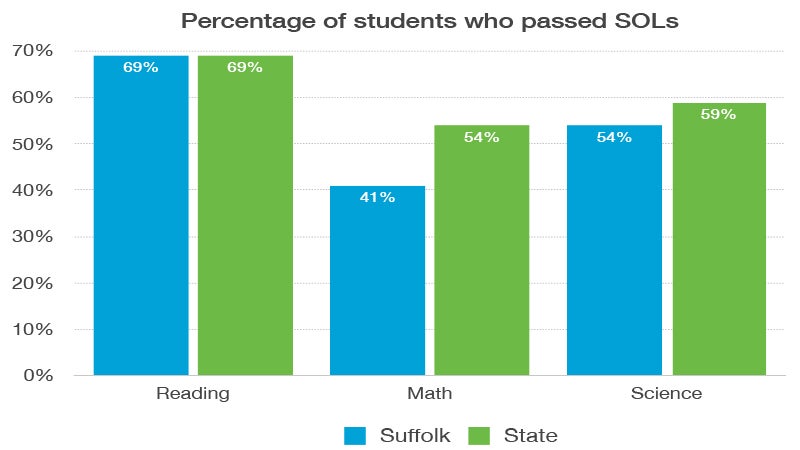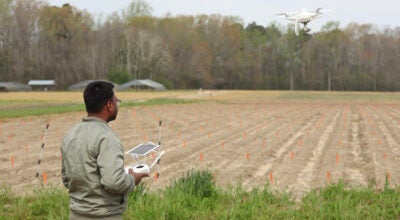City, state SOL scores ‘reflect unprecedented challenges’
Published 8:26 pm Thursday, August 26, 2021
|
Getting your Trinity Audio player ready...
|
Pass rates for Suffolk public school students on reading, math and science mirrored the state in the declines between the last full school year before the coronavirus pandemic, and the past school year in which students were in virtual learning until early spring when the division moved to a hybrid format.
The Virginia Department of Education on Thursday reported statewide SOL test data, which showed that declines were sharpest in math, though there were also drops in reading and science assessments.
However, local and state school officials have been preparing for the precipitous fall in 2020-2021 Standards of Learning pass rates, citing the “extraordinary circumstances” as school divisions navigated the murkiness of creating a robust learning environment for students in the midst of COVID-19.
Officials have said that the most recent results will set the baseline for recovery from learning loss, and they discouraged comparisons between the newly released pass rates and those from previous years.
“What matters now is where we go from here,” said Superintendent of Public Instruction Dr. James Lane in a statement, “and we will use the data from the SOLs to identify the unique needs of every learner as our schools resume in-person instruction for all students.”
The 2021 SOL tests were the first state assessments in two years since testing in 2019-2020 was canceled. Students were required to take SOL tests in-person to keep with testing security procedures. Fewer students who qualified for retakes actually took them due to the state accreditation waiver for the upcoming school year.
Statewide, fewer students in tested grades took the assessments in 2021, with 75.5% of students taking the reading assessment, 78.7% taking math and 80% taking science.
For students in Suffolk Public Schools who took them, 69% passed the reading assessment, mirroring the state pass rate. In math, 41% passed that assessment in Suffolk, shy of the state’s 54% pass rate, and in science, 54% of the city’s public school students passed that assessment, compared to 59% of the state’s students.
Math pass rates dropped by 36% to 49%, while reading pass rates declined by 6% to 12%. End-of-course reading pass rates went down just 4%.
Fifth and eighth-graders took science assessments during the past school year, with 43% of fifth-graders passing and 52% of eighth-graders passing.
“Virginia’s 2020-2021 SOL test scores tell us what we already knew — students need to be in the classroom without disruption to learn effectively,” Lane said. “The connections, structures, and supports our school communities provide are irreplaceable, and many students did not have access to in-person instruction for the full academic year. We must now focus on unfinished learning and acceleration to mitigate the impact the pandemic has had on student results.”
Suffolk Public Schools expanded its summer programming, and besides having students in person five days per week to start the new school year, it is also putting in place a Saturday school and extra tutoring to mitigate issues and expand learning opportunities for students.
“We’re going to try and set up a Saturday school for tutoring and additional support, also potentially be able to allow kids to be able to make up work,” said Superintendent Dr. John B. Gordon III in an interview earlier this month. “I’m not sure about the assessment piece yet, but we’re probably going to end up doing that both face-to-face and virtual, and right now because of our numbers, we’ll probably end up leaning more toward virtual, just to get some support.
“Everyone’s talked about learning loss for so long, and I want to get past that and really begin to look toward next year. So now that I have kids coming back here (Sept. 7), I’ve still got to find ways to support them, especially since some of our kids still haven’t been in school in a normal school year yet.”
Gordon said the Saturday school would likely start in October at the elementary, middle and high school levels. If the division opts to do it in person, Gordon said it would likely be at three elementary schools, one middle school and one high school.
“Those are things we’ve got to take a look at,” Gordon said, “because we’ve got to see how many kids actually need it first, which will then determine the staff we’ll need to make it work. And more than likely, it’s going to be optional, but we’re going to try to require it for some kids that we already see that are starting to fall behind.”
The division also plans to use its Z-block before school to help students who failed classes during the most recent school year, and offer middle school after-school tutoring and elementary school tutoring before school, either in person or virtually. It is also looking to offer tutoring at Turlington Woods School and at the College and Career Academy at Pruden.
It also plans to add two additional site coordinators in schools to assess student needs, and provide instruction and remediation support with virtual tutors collaborating with classroom teachers in math, English and other subjects.
The Saturday school, tutoring and other support programs at the elementary, middle and high school levels are among the items SPS is using federal CARES Act Part III funding for, as it must spend at least 20% of the money toward addressing learning loss. Those programs are budgeted at just over $4.1 million.
Suffolk Public Schools SOL pass rates 2020-2021 (2018-2019 in parentheses)
3rd grade
Reading: 59% (71%)
Math: 44% (80%)
4th grade
Reading: 66% (72%)
Math: 45% (83%)
5th grade
Reading: 67% (79%)
Math: 40% (85%)
Science: 43% (82%)
6th grade
Reading: 66% (77%)
Math: 32% (81%)
7th grade
Reading: 71% (79%)
Math: 24% (70%)
8th grade
Reading: 70% (76%)
Math: 38% (83%)
Science: 52% (78%)
End of course
Reading: 81% (85%)
Algebra I: 45% (90%)
Algebra II: 58% (91%)
Geometry: 58% (85%)
Biology: 61% (85%)
Chemistry: N/A (91%)
Earth Science: 60% (88%)
Source: Virginia Department of Education
Note: No SOL assessments were given in 2019-2020. Also, scores from history or writing SOLs were not reported because local school divisions had the option to give local assessments.







